‘What the deuce is it to me?”‘ he interrupted impatiently: ‘you say that we go round the sun. if we went round the moon it would not make a pennyworth of difference to me or to my work.’– Sherlock Holmes, A Study in Scarlet
Dear friends and readers,
Mr Holmes has a couple of obstacles or problems to wide-spread acclaim. It is melancholy. Its themes include how to cope with aging and its losses, death, stigmatized class status (a no-no). For those brought up on the action-adventure of Robert Downey, Jude Law, Michael Strong and Rachel McAdams, it will not answer your expectations; for those still wedded to Basil Rathbone and Nigel Bruce (to say too little of the justified paranoia of WW2), it will make fun of the 1943 fanatical adherence to the deerstalker hunting cap and pipe (Holmes goes to a black-and-white simulacrum of such a movie and just cannot sit through it); it lacks the giddy pace and surrealism of the first 2 seasons of the BBC Cumberbatch and Freeman Sherlock concoctions; but to say it’s not Holmesian (as the New Yorker guru critic in residence, Anthony Lane means to insinuate) is just not so.
I concede fully that the perspective is post-modern (conventional thought and cant, especially about death and grief be damned), that there is something deliciously Jamesian (Henry) about it. Characters have deeply traumatic encounters on park benches while wearing impeccable hats.
They fail to understand one another, cannot bear one another’s emotions. It moves slowly, with shots that capture a poetry of stillness and costume drama in its green landscapes, seascapes, the sina qua non steam train rushing serpentine and noisily through. More than twice, though in one climactic instance it matters as someone is (reminding me of a Trollope scene in The Prime Minister) voluntarily smashed to smithereens.
But that it’s not Holmesian is unfair. Once you try to drill down to what could be the psychological or thematic or even political motive or moral explanation of at least two of its flashback and front story plots, you end up with ideas that will not bear any scrutiny. Convention defeats me here: I do not claim to be writing a consistently post-modern blog so allow me to explicate and show at least miminal story consistency.
There are three time frames: the present, 1947, Mr Holmes, aged 93, losing the last vestiges of memory from the past, living on the south coast of England, cared for by a housekeeper (natch) Mrs Munroe (Laura Linney) and her son, Roger (Milo Parker) who turns to Mr Holmes as father figure because his own father died in WW2: a bitter moment of memory has Linney as Mrs Munroe remembering how, like herself, her husband, was corroded by the stigmas of lower class status, and for his efforts to become a pilot in WW2, was blown to bits immediately (his mates, content to be menial mechanics all survived the war).
A story from thirty years ago is painstakingly put together (& dramatized as flashbacks) by Mr Holmes about Ann Kelmot (Hattie Morahan) who had two miscarriages or stillborn children, cannot accept this and whose grief is only moderated by lessons she eventually finds for the glass harp (Frances la Tour, the crook teacher), whose intensity bothers her husband to the point he cuts off her money-supply and refuses to set up stone monuments for the never-developed nor born children. It is not giving away the story to say she plots to kill her husband.
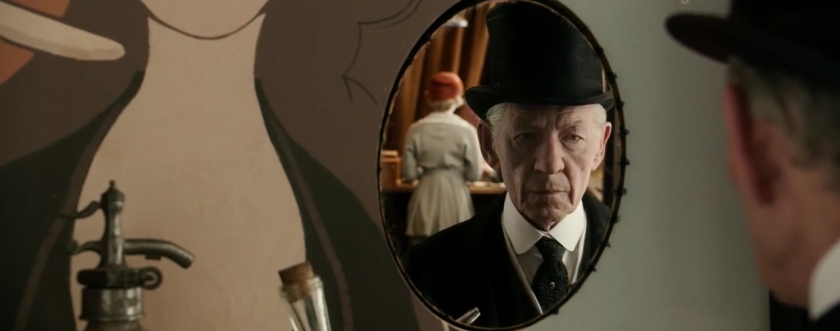
Holmes (McKellen) remembering (a difficult feat in the this story) Ann Kelmot (Hattie Morahan)
It’s not true though that there is no sense to this story. The moral is the husband was wrong; he should have allowed his wife to be deluded by the crook teacher — this reminded me of Woody Allen’s frequent defenses of fortune-tellers in many of his movies and there is a fortune-telling scene here.
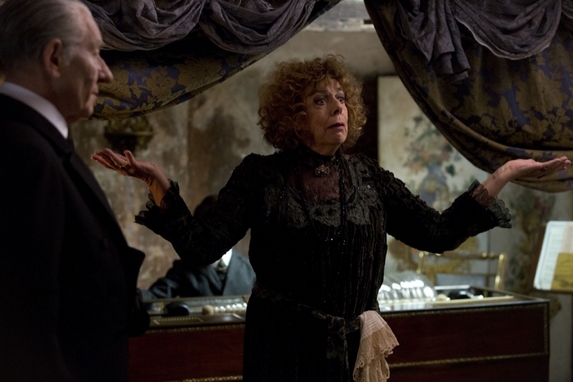
The glass harp medium (Frances de la Tour, aka Mrs Western in the 1997 Tom Jones)
Another backstory told through interwoven flashbacks is set in Japan: Holmes has gone to Hiroshima (1946?) to obtain a promised solution of which is said to restore the memory, only to find himself confronted by a Japanese man who accuses Holmes of seducing his father away from him and his mother through the stories of Dr Watson (The Study in Scarlet is the culprit), all the while we know that Holmes now deplores Watson’s fictions a providing false gratifying endings and heroism, with many details so wrong they are embarrassing. Of course this story “falls to pieces in your hands” (as Lane says). Worse, the explanation is reactionary defense of “national” and family secrets, of absurd honor which one sacrifices one’s life for? What Conan Doyle story does not do something like this?
It is Holmes’s self-imposed mission in the film to retrieve: to retrieve the memory of who his Japanese man was (until near the end Holmes believes the man a liar, coward, and that he never met him — the man just deserted his family); to compensate for how inadequate, insensitive, absurd, selfish was his Jeremy Brett-like behavior to Anne Kelmot (the way this Kelmot thread is dramatized is closely reminiscent of the 1980s BBC Holmes movies), something which depends on memory and rewriting Watson’s story.
Much of this is done through the techniques of filmic epistolarity: voice-over with Holmes writing out new texts to replace Watson’s. Part of the fun of this is withholding. We do not see Mycroft (who explicates the Japanese story) until near the end of the film and it’s John Sessions (for me memorable as Henry Fielding, also in the 1997 Tom Jones); we do not see the bumbling inspector (played by Phil Davis, great in sinister, threatening roles in Dickensian film adaptations, now Jud in Poldark), until near the end. There is fun in recognizing these character actors from other costume dramas quietly semi-parodying the roles.
Indeed the uplift at the close is the same fantasy Dickens plays upon in A Christmas Carol. We are asked to believe that people can make up for what they did wrong in the past, find a new person like the one you so hurt now to do better by. We do come near searing calamity in the present, brought on by both Mrs Munroe and Mr Holmes. I can’t deny that sometimes people (as characters) are lucky. The film is as Dickensian as it is Jamesian.
Hattie Morahan was once again “emotionally aflame” — Lane talks of her in A Doll’s House in BAM, but she was astonishing in Duchess of Malfi and I still watch her as Elinor refusing solace. I felt bad for Laura Linney(unbeatable in Love Actually, unforgettable in Hyde Park on the Hudson) that she was given the howling role. I found myself crying at the close because I couldn’t believe in the self-reproach and better behavior of our principal trio: Mr Holmes and Mrs Munroe, to say nothing of the maturation of Roger.
If I had anything to object to in this film it was that both Ian McKellen (too many great films and plays to begin to cite) and Laura Linney could have been given much more deeply nuanced moments. She is literally kept behind bars, looking out from windows:
The film-makers were chary about releasing stills of McKellen showing the ravages of old age in the film, as he falls, eats, puts down stones for those who have gone before him. There was a pandering to the sub-genre of old man-and-hopeful worshipping-boy
OTOH, the beautiful loving feeling at the close of the film was authentic. Doyle’s ever-cool, ever witty, impatient Sherlock is now taking the risk of giving of himself; entering into loving relationships directly. Mr Holmes will leave the property to Mrs Monro and her boy when he dies. We see Mrs Munro and Roger in the garden working together and we see them walk off hand-in-hand too. The boy is now respectful of his mother under an eye of approval by Mr Holmes. He is 94, and we last seem him putting down stones (as Ann Kelmot did) for each of his friends now gone to the earth. He bows before them murmuring a lullaby. McKellen himself is very old now. It is a summer movie because through Jeffrey Hatcher’s marvelous screenplay McKellan as Mr Holmes is believable and comforts you.
Ellen


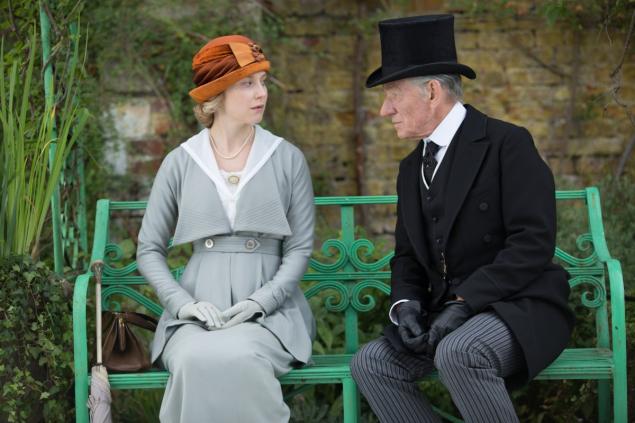
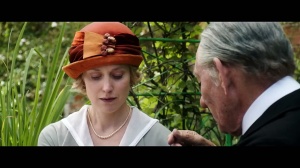
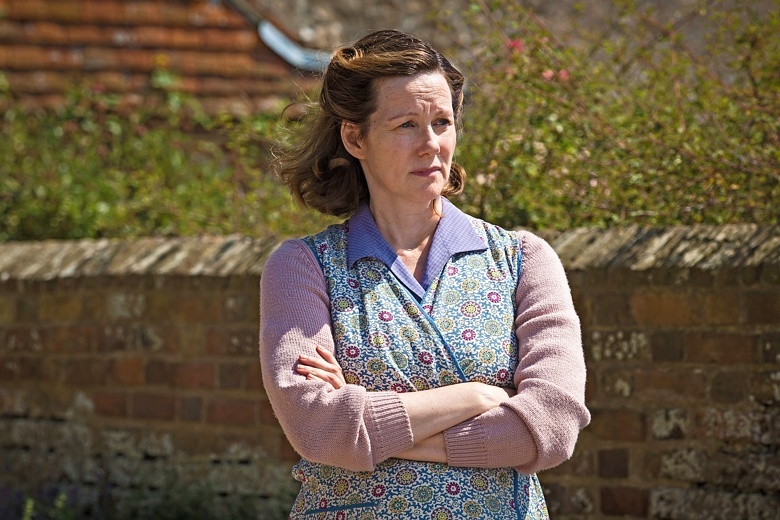


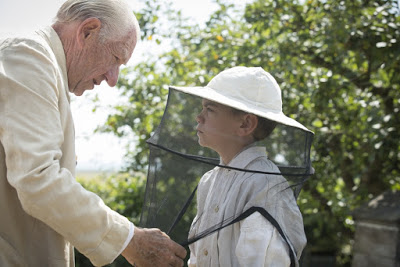
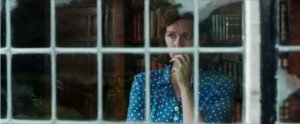
Liked your review of Mr Holmes and agree whole-heartedly. If it “pleas’d not the million, ’twas caviare to the general” (my sister and I caught the last showing at our local cinema and we were the only two there!), and, as you say, captured the essence of Holmes while still having something to say about ageing and memory.
Regards Robert Ward
My friend and I were there for a later afternoon showing and there were an unusual number of people in the audience for that time. But two left after about half an hour or so; one of them had been looking at his cell phone. I saw a woman asleep — sitting next to her (I presume) husband who looked very alert. My friend who is French did not get the way the plots intertwined . Tis caviare.
Thanks for this, Ellen, looking forward to seeing Ian McKellen in Mr Holmes. I usually buy a DVD of any film I seriously wish to see, as going to cinema venues is so discouraging ~ the awful manners of the audience, the very loud (badly calibrated) audio track, etc. No pleasure.
Yes, a good hat on Morahan, she wears it well. Wearers of hats must have an instinctive flair, they must be able to ‘carry’ the hat; few can. Vita Sackville-West surely could. Saul Bellow looked a bit odd in his hats. I’m a great lover of hats, have a varied collection ~ tams & berets, Dublin cloches, fedoras, bowlers, & several large-brimmed affairs, as in the image attached (in context, as a framed painting, this is stunning; image attached is but a small detail ~ the grey color gradations of the background, or field, are quite good, and then all the rich color).
I dislike how the nearby audience members laugh when it’s not funny or are desperate (like Polonius) for a laugh. These are intrusions, crude, mean, stupid, and make me feel uncomfortable as these are responses that are embarrassing — Once I went to a Jane Eyre movie and had to realize the audience was filled with people who didn’t know the story, were genuinely in suspense.
I’ve become educated about hats in costume dramas since Downton Abbey — in a way the best thing about the show intellectually or from an aesthetic standpoint were the hats :). Not that I don’t like hats in life, cloches and big ones. I used to buy a new one every couple of years for the point-to-point races Jim and I would go in the fall and spring in mid-Virginia. I also wear scarves.
Thanks to Fran: these are the marvelous illustrations that set the original icons picked up by Basil Rathbone going: here they- beautifully reproduced, just about as good as the originals in faded books: look at the blue shades, the caught shadows and lines:
https://archive.org/stream/TheStrandMagazineAnIllustratedMonthly/TheStrandMagazine1891bVol.IiJul-dec#page/n71/mode/2up
This coming Christmas Cumberbatch and Freeman will be back in 1890s costume: my guess is that the film-makers have (wisely) seen the adaptations went off the rails too far when they married Watson and brought in Holmes’s family for all the world as if it were another situation comedy (which some of these PBS mysteries from the BBC are in disguise).
Hi Ellen,
From what I understand, the upcoming Christmas special of Sherlock on BBC is to be an episode to itself. That makes me think season 4 will pick up in the modern day where season 3 left off. Personally, I’d prefer a Victorian Holmes, but I wonder whether they’d lose the fan base to revert back to that period, and honestly, the films with Robert Downey Jr and Jude Law didn’t work for me – too over the top – even with the Victorian setting.
Tyler
I’ve never seen the Downey and Law series — only read about them, and seen but one Basil Rathbone. I’m no afficionado of these Holmes films as I (to tell the truth) think most of the Holmes stories over-rated. They grow thinner and thinner as they go on, and the fans pour in or invest content of their own. What’s happened is the films over the century have enriched the writing so we cannot read it in the way we would without them. I see the illustrations similarly.
I was amused to notice how this series (like the coming Christmas special with Cumberbatch and Freeman in costume) makes fun of the icons: the deerstalker hat does make Holmes into a hunter, the cape an elegant gentleman, and pipe Edwardian. At one point one character in Mr Holmes says like Mrs Hudson in the new Sherlock BBC Christmas special, I’m not or this is not a plot device. The fun is in the self-reflexivity so hiring actors we reocognize from other roles fits too.
John Wirenius: Looking forward to seeing this; as a Holmes reader since boyhood, a good riff on the character is always of interest. (I think of Jeremy Brett’s as the most literal translation, quite like the Moffat/Gatiss Sherlock–which uses the fan’s knowledge of the original stories to deceive and subvert the viewer–and intermittently enjoy Elementary which is sometimes quite good but too often a routine police procedural.)
Me: I’d like to have seem more of the Elementaries. I’ve seen only 2 early ones at a friend’s house where she watched them w/o commercials. I find the commercials making watching impossible. A small personal crow; the screenplay writer for it was Jeffrey Hatcher; he was the writer who heard my papers on the importance of screenplays at the recent 18th century meeting, and came up to me and told me he liked and agreed with my paper. Of course he would not think them unimportant, but it was he liked the attitude of mind towards the screenplay I evinced and used. I was delighted the screenplay — the wit of the dialogues, the structuring — was very good.
Ann E. Michael: “I liked it very much, as did my two Holmes-devoted (read the canon many times) chaperones.
I loved your Jamesian sentence: ‘Characters have deeply traumatic encounters on park benches while wearing impeccable hats.'”
A review by Bilge Eviri (?) from Vulture (?) which praises the film strongly:
http://www.vulture.com/2015/07/ian-mckellen-is-a-fine-complicated-mr-holmes.html
I”m not sure it’s this good but I agree with it more or less and she shows how Anthony Lane of New Yorker vintage just didn’t get it.
Ellen
7/29/2015:
I re-saw this with my two daughters last night. Sometimes if you see a film twice, it just falls apart and you see all the flaws, especially quickly.
I bring this one up as it’s still in the theaters and on second viewing it not only held up, but I found I was unfair to the genuine emotions stirred in it. I had missed things (images juxtaposed whose meaning I only understood on a second viewing); I began to realize the 1946 story’s ending was meant as kind fiction (the man probably had left his wife and son and used Watson’s silly story of all self-sacrificing work against “spies” and “terrorism” as an excuse). It’s a comfort movie.
So many this summer have been voyeuristic exposes of males suffering (Peoples places and things has horrible women in it) whom we are not really to compassionate — or the occasional woman (Amy). In comparison this was a healthy film, and while complicated not a muddle like the new Poldarks.
Ellen
I enjoyed it very much, aside from the resolution regarding Tamiki Umezaki. I found that resolution unrealistic and hard to swallow. Otherwise, I didn’t have much problem with the movie.
I have the book and wish I had time to read it. I hope eventually to get there. It’s in the context of the other movies playing in commercial movie-houses that Mr Holmes stands out as excellent.